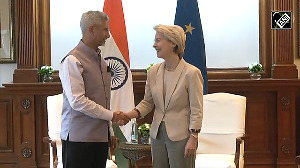Sven-Goran Eriksson is unlikely to lose his job as England manager when he faces an FA Board inquiry on Thursday but one guaranteed outcome is that the sport's governing body will again be left looking incompetent.
The latest "FA in crisis" headlines have been created not because of Eriksson and the former FA chief executive Mark Palios's relationships with a female employee but because of the organisation's inability to deal with the situation.
| |||||||||||
The FA's director of communications Colin Gibson, an experienced former national newspaper sports editor who should have known better, was involved in an attempt to save the job of Palios by offering details of Eriksson's involvement with secretary Faria Alam to the News of the World.
Palios subsequently resigned, though said he had done nothing wrong, and Gibson offered to follow him seven months after being brought in to try to rebuild the FA's reputation.
Eriksson, meanwhile, kept his counsel and will give his side of the story on Thursday.
INITIAL DENIAL
English newspapers have reported that the FA's initial denial was issued after Eriksson told executive director David Davies the story was "nonsense".
Whether that term applied to the fact of an affair or the concept that it was not anybody's business to be asking about it is at the crux of the matter and Eriksson and his lawyers will no doubt argue that he at no time lied to his employers.
With the FA facing a 10 million pounds ($18.28 million) compensation claim should they find a way to oust the Swede, there seems little chance of him losing his 4 million pounds per year job just a few months after having his contract extended.
Many on the 12-man board who will vote on Eriksson's future are clearly unhappy with the current situation and, coming after England's failure in Euro 2004, some of them would no doubt be happy to see the back of the country's first foreign manager.
But they will also be aware that his personal relationship with Alam is not a sacking matter and will be more concerned with how the whole situation was allowed to blow out of control by his employers.
It should come as no surprise, however, as the FA has a long and undistinguished history of embarrassing gaffes.
Six years ago former chief executive Graham Kelly and chairman Keith Wiseman departed in a "cash for votes" scandal and months later England manager Glenn Hoddle followed them.
Hoddle's official crime was to tell a journalist that he believed in reincarnation and that people born with a disability were being punished for the sins of a former life.
However, he had already lost the backing of the FA partly for publishing his diary of the 1998 World Cup, seen by many as a betrayal of trust that should never have been allowed.
BUMBLING FARCE
The long-running and ridiculously expensive building of a new Wembley stadium was also a bumbling farce, leading in part to the departure of previous chief executive Adam Crozier, who had made many enemies as he tried to run the organisation on a more businesslike footing.
Last season FIFA president Sepp Blatter described the FA's handling of the Rio Ferdinand affair as a "textbook example of how not to deal with a doping case".
Now the 12-man board, comprised of six representatives from the premier and football leagues and six from outside, is faced with the task of putting the lid on the latest off-field drama just a few days before the season kicks off.








 © 2025
© 2025